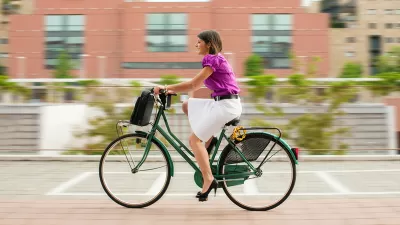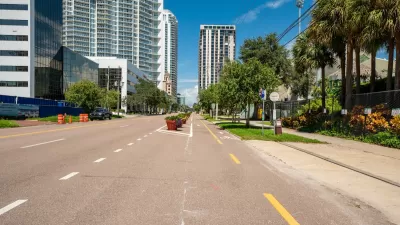In addition to reducing air pollution and congestion, improving bike infrastructure could save thousands of lives each year, according to new research.

A new study that models the "comprehensive global public health impacts of the mode shift to cycling" found that replacing car trips with bike trips can prevent over 15,000 deaths per year in the U.S. alone, reports Kea Wilson for Streetsblog.
The study analyzed rates of premature deaths due to car crashes and pollution-related disease, as well as how many car trips could be replaced with robust investment in bike infrastructure and other incentives.
Even if just 8 percent of those new bike trips replaced journeys in a car — an extraordinarily conservative estimate, considering that in this hypothetical world, every urban area in the world would be outfitted with Amsterdam-levels of bike lanes — researchers say that 18,589 lives could be saved across the globe, 1,227 of which would be in the U.S. alone.
Meanwhile, even people not using bikes would benefit from improved air quality, reduced congestion, and better overall mobility. "In addition to the impacts modeled in his study, [study author David] Rojas points out that bikeable communities typically have more green space, more real estate to devote to affordable housing, healthy food providers, and other essential services in every neighborhood, and lower levels of noise pollution, all of which have an impact on the physical and mental health of their residents."
FULL STORY: STUDY: Better Bike Policy Could Prevent 15K U.S. Deaths Every Year — And Not Just in Crashes

Maui's Vacation Rental Debate Turns Ugly
Verbal attacks, misinformation campaigns and fistfights plague a high-stakes debate to convert thousands of vacation rentals into long-term housing.

Planetizen Federal Action Tracker
A weekly monitor of how Trump’s orders and actions are impacting planners and planning in America.

In Urban Planning, AI Prompting Could be the New Design Thinking
Creativity has long been key to great urban design. What if we see AI as our new creative partner?

How Trump's HUD Budget Proposal Would Harm Homelessness Response
Experts say the change to the HUD budget would make it more difficult to identify people who are homeless and connect them with services, and to prevent homelessness.

The Vast Potential of the Right-of-Way
One writer argues that the space between two building faces is the most important element of the built environment.

Florida Seniors Face Rising Homelessness Risk
High housing costs are pushing more seniors, many of them on a fixed income, into homelessness.
Urban Design for Planners 1: Software Tools
This six-course series explores essential urban design concepts using open source software and equips planners with the tools they need to participate fully in the urban design process.
Planning for Universal Design
Learn the tools for implementing Universal Design in planning regulations.
Gallatin County Department of Planning & Community Development
Heyer Gruel & Associates PA
JM Goldson LLC
City of Camden Redevelopment Agency
City of Astoria
Transportation Research & Education Center (TREC) at Portland State University
Jefferson Parish Government
Camden Redevelopment Agency
City of Claremont





























